Entrepreneurship: Types of Ventures, SME's, and Entrepreneurial Traits
VerifiedAdded on 2020/06/06
|12
|3385
|176
Report
AI Summary
This report provides a comprehensive overview of entrepreneurship and small business management, encompassing various types of entrepreneurial ventures, including public and private sector organizations, social entrepreneurs, and lifestyle entrepreneurs. It delves into the similarities and differences between social and lifestyle entrepreneurship, highlighting their respective focuses and objectives. The report then examines the significant impact of SMEs on the UK economy, supported by relevant data and statistics, and explains the crucial role of SMEs and business start-ups in fostering social economic growth. Furthermore, it identifies the key characteristics, traits, and skills essential for entrepreneurs, assessing aspects of entrepreneurial personality, motivation, and mindset. Finally, the report explores environmental factors that can either hinder or foster entrepreneurship, providing a holistic view of the entrepreneurial landscape. The report also draws on examples of Dalian Wanda and Infosys to illustrate key concepts.

ENTREPRENEURSHIP AND
SMALL BUSINESS
MANAGEMENT
SMALL BUSINESS
MANAGEMENT
Paraphrase This Document
Need a fresh take? Get an instant paraphrase of this document with our AI Paraphraser
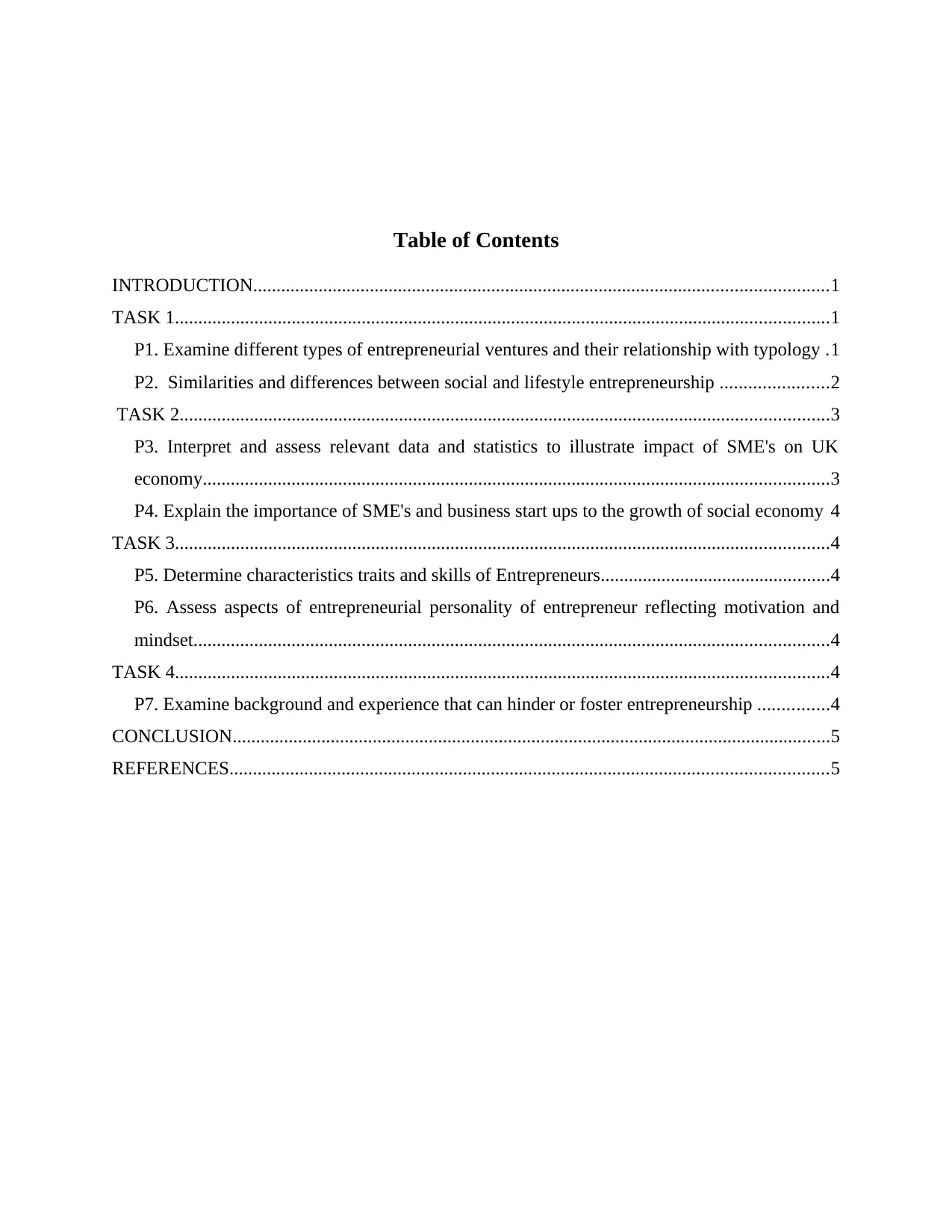
Table of Contents
INTRODUCTION...........................................................................................................................1
TASK 1............................................................................................................................................1
P1. Examine different types of entrepreneurial ventures and their relationship with typology .1
P2. Similarities and differences between social and lifestyle entrepreneurship .......................2
TASK 2...........................................................................................................................................3
P3. Interpret and assess relevant data and statistics to illustrate impact of SME's on UK
economy......................................................................................................................................3
P4. Explain the importance of SME's and business start ups to the growth of social economy 4
TASK 3............................................................................................................................................4
P5. Determine characteristics traits and skills of Entrepreneurs.................................................4
P6. Assess aspects of entrepreneurial personality of entrepreneur reflecting motivation and
mindset........................................................................................................................................4
TASK 4............................................................................................................................................4
P7. Examine background and experience that can hinder or foster entrepreneurship ...............4
CONCLUSION................................................................................................................................5
REFERENCES................................................................................................................................5
INTRODUCTION...........................................................................................................................1
TASK 1............................................................................................................................................1
P1. Examine different types of entrepreneurial ventures and their relationship with typology .1
P2. Similarities and differences between social and lifestyle entrepreneurship .......................2
TASK 2...........................................................................................................................................3
P3. Interpret and assess relevant data and statistics to illustrate impact of SME's on UK
economy......................................................................................................................................3
P4. Explain the importance of SME's and business start ups to the growth of social economy 4
TASK 3............................................................................................................................................4
P5. Determine characteristics traits and skills of Entrepreneurs.................................................4
P6. Assess aspects of entrepreneurial personality of entrepreneur reflecting motivation and
mindset........................................................................................................................................4
TASK 4............................................................................................................................................4
P7. Examine background and experience that can hinder or foster entrepreneurship ...............4
CONCLUSION................................................................................................................................5
REFERENCES................................................................................................................................5
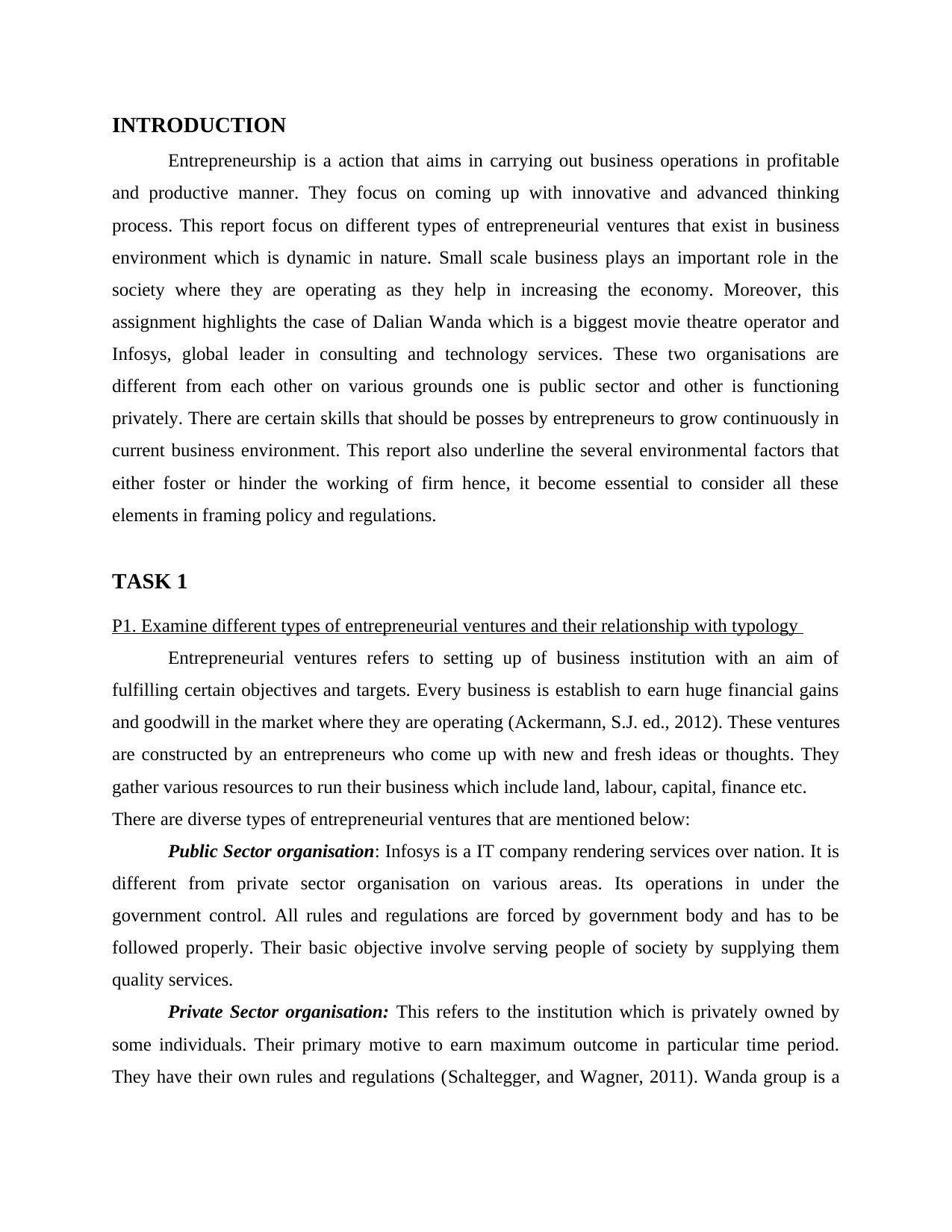
INTRODUCTION
Entrepreneurship is a action that aims in carrying out business operations in profitable
and productive manner. They focus on coming up with innovative and advanced thinking
process. This report focus on different types of entrepreneurial ventures that exist in business
environment which is dynamic in nature. Small scale business plays an important role in the
society where they are operating as they help in increasing the economy. Moreover, this
assignment highlights the case of Dalian Wanda which is a biggest movie theatre operator and
Infosys, global leader in consulting and technology services. These two organisations are
different from each other on various grounds one is public sector and other is functioning
privately. There are certain skills that should be posses by entrepreneurs to grow continuously in
current business environment. This report also underline the several environmental factors that
either foster or hinder the working of firm hence, it become essential to consider all these
elements in framing policy and regulations.
TASK 1
P1. Examine different types of entrepreneurial ventures and their relationship with typology
Entrepreneurial ventures refers to setting up of business institution with an aim of
fulfilling certain objectives and targets. Every business is establish to earn huge financial gains
and goodwill in the market where they are operating (Ackermann, S.J. ed., 2012). These ventures
are constructed by an entrepreneurs who come up with new and fresh ideas or thoughts. They
gather various resources to run their business which include land, labour, capital, finance etc.
There are diverse types of entrepreneurial ventures that are mentioned below:
Public Sector organisation: Infosys is a IT company rendering services over nation. It is
different from private sector organisation on various areas. Its operations in under the
government control. All rules and regulations are forced by government body and has to be
followed properly. Their basic objective involve serving people of society by supplying them
quality services.
Private Sector organisation: This refers to the institution which is privately owned by
some individuals. Their primary motive to earn maximum outcome in particular time period.
They have their own rules and regulations (Schaltegger, and Wagner, 2011). Wanda group is a
Entrepreneurship is a action that aims in carrying out business operations in profitable
and productive manner. They focus on coming up with innovative and advanced thinking
process. This report focus on different types of entrepreneurial ventures that exist in business
environment which is dynamic in nature. Small scale business plays an important role in the
society where they are operating as they help in increasing the economy. Moreover, this
assignment highlights the case of Dalian Wanda which is a biggest movie theatre operator and
Infosys, global leader in consulting and technology services. These two organisations are
different from each other on various grounds one is public sector and other is functioning
privately. There are certain skills that should be posses by entrepreneurs to grow continuously in
current business environment. This report also underline the several environmental factors that
either foster or hinder the working of firm hence, it become essential to consider all these
elements in framing policy and regulations.
TASK 1
P1. Examine different types of entrepreneurial ventures and their relationship with typology
Entrepreneurial ventures refers to setting up of business institution with an aim of
fulfilling certain objectives and targets. Every business is establish to earn huge financial gains
and goodwill in the market where they are operating (Ackermann, S.J. ed., 2012). These ventures
are constructed by an entrepreneurs who come up with new and fresh ideas or thoughts. They
gather various resources to run their business which include land, labour, capital, finance etc.
There are diverse types of entrepreneurial ventures that are mentioned below:
Public Sector organisation: Infosys is a IT company rendering services over nation. It is
different from private sector organisation on various areas. Its operations in under the
government control. All rules and regulations are forced by government body and has to be
followed properly. Their basic objective involve serving people of society by supplying them
quality services.
Private Sector organisation: This refers to the institution which is privately owned by
some individuals. Their primary motive to earn maximum outcome in particular time period.
They have their own rules and regulations (Schaltegger, and Wagner, 2011). Wanda group is a
⊘ This is a preview!⊘
Do you want full access?
Subscribe today to unlock all pages.

Trusted by 1+ million students worldwide
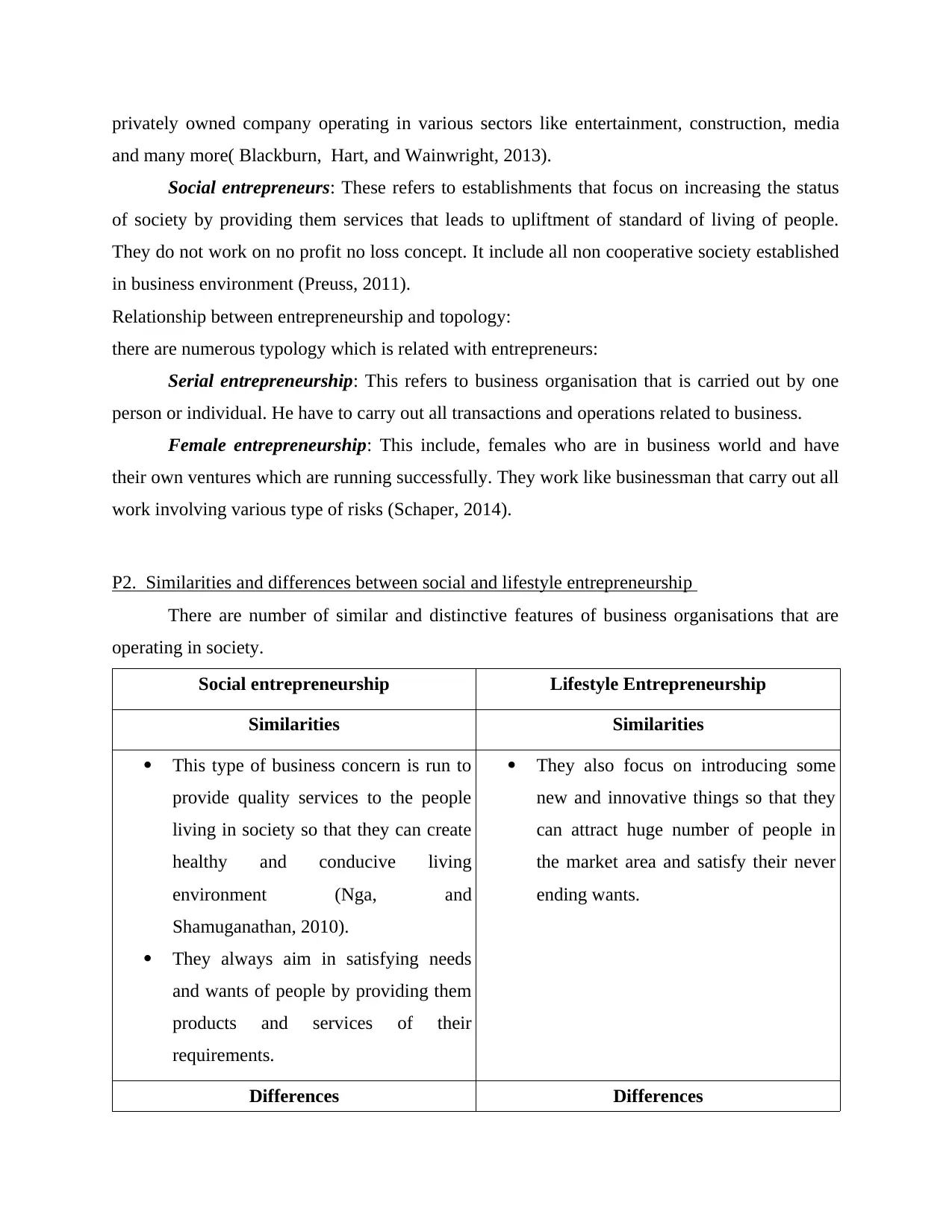
privately owned company operating in various sectors like entertainment, construction, media
and many more( Blackburn, Hart, and Wainwright, 2013).
Social entrepreneurs: These refers to establishments that focus on increasing the status
of society by providing them services that leads to upliftment of standard of living of people.
They do not work on no profit no loss concept. It include all non cooperative society established
in business environment (Preuss, 2011).
Relationship between entrepreneurship and topology:
there are numerous typology which is related with entrepreneurs:
Serial entrepreneurship: This refers to business organisation that is carried out by one
person or individual. He have to carry out all transactions and operations related to business.
Female entrepreneurship: This include, females who are in business world and have
their own ventures which are running successfully. They work like businessman that carry out all
work involving various type of risks (Schaper, 2014).
P2. Similarities and differences between social and lifestyle entrepreneurship
There are number of similar and distinctive features of business organisations that are
operating in society.
Social entrepreneurship Lifestyle Entrepreneurship
Similarities Similarities
This type of business concern is run to
provide quality services to the people
living in society so that they can create
healthy and conducive living
environment (Nga, and
Shamuganathan, 2010).
They always aim in satisfying needs
and wants of people by providing them
products and services of their
requirements.
They also focus on introducing some
new and innovative things so that they
can attract huge number of people in
the market area and satisfy their never
ending wants.
Differences Differences
and many more( Blackburn, Hart, and Wainwright, 2013).
Social entrepreneurs: These refers to establishments that focus on increasing the status
of society by providing them services that leads to upliftment of standard of living of people.
They do not work on no profit no loss concept. It include all non cooperative society established
in business environment (Preuss, 2011).
Relationship between entrepreneurship and topology:
there are numerous typology which is related with entrepreneurs:
Serial entrepreneurship: This refers to business organisation that is carried out by one
person or individual. He have to carry out all transactions and operations related to business.
Female entrepreneurship: This include, females who are in business world and have
their own ventures which are running successfully. They work like businessman that carry out all
work involving various type of risks (Schaper, 2014).
P2. Similarities and differences between social and lifestyle entrepreneurship
There are number of similar and distinctive features of business organisations that are
operating in society.
Social entrepreneurship Lifestyle Entrepreneurship
Similarities Similarities
This type of business concern is run to
provide quality services to the people
living in society so that they can create
healthy and conducive living
environment (Nga, and
Shamuganathan, 2010).
They always aim in satisfying needs
and wants of people by providing them
products and services of their
requirements.
They also focus on introducing some
new and innovative things so that they
can attract huge number of people in
the market area and satisfy their never
ending wants.
Differences Differences
Paraphrase This Document
Need a fresh take? Get an instant paraphrase of this document with our AI Paraphraser
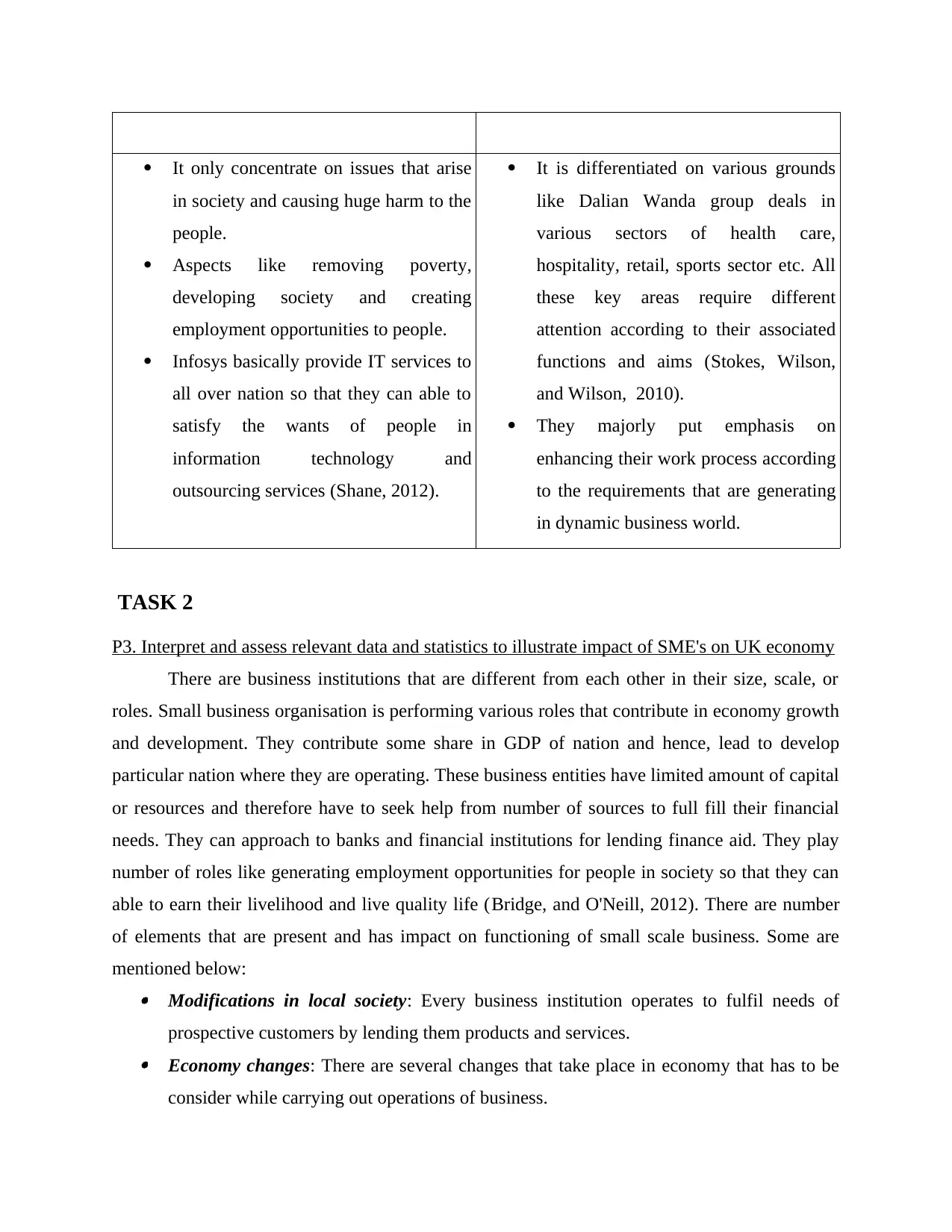
It only concentrate on issues that arise
in society and causing huge harm to the
people.
Aspects like removing poverty,
developing society and creating
employment opportunities to people.
Infosys basically provide IT services to
all over nation so that they can able to
satisfy the wants of people in
information technology and
outsourcing services (Shane, 2012).
It is differentiated on various grounds
like Dalian Wanda group deals in
various sectors of health care,
hospitality, retail, sports sector etc. All
these key areas require different
attention according to their associated
functions and aims (Stokes, Wilson,
and Wilson, 2010).
They majorly put emphasis on
enhancing their work process according
to the requirements that are generating
in dynamic business world.
TASK 2
P3. Interpret and assess relevant data and statistics to illustrate impact of SME's on UK economy
There are business institutions that are different from each other in their size, scale, or
roles. Small business organisation is performing various roles that contribute in economy growth
and development. They contribute some share in GDP of nation and hence, lead to develop
particular nation where they are operating. These business entities have limited amount of capital
or resources and therefore have to seek help from number of sources to full fill their financial
needs. They can approach to banks and financial institutions for lending finance aid. They play
number of roles like generating employment opportunities for people in society so that they can
able to earn their livelihood and live quality life (Bridge, and O'Neill, 2012). There are number
of elements that are present and has impact on functioning of small scale business. Some are
mentioned below: Modifications in local society: Every business institution operates to fulfil needs of
prospective customers by lending them products and services. Economy changes: There are several changes that take place in economy that has to be
consider while carrying out operations of business.
in society and causing huge harm to the
people.
Aspects like removing poverty,
developing society and creating
employment opportunities to people.
Infosys basically provide IT services to
all over nation so that they can able to
satisfy the wants of people in
information technology and
outsourcing services (Shane, 2012).
It is differentiated on various grounds
like Dalian Wanda group deals in
various sectors of health care,
hospitality, retail, sports sector etc. All
these key areas require different
attention according to their associated
functions and aims (Stokes, Wilson,
and Wilson, 2010).
They majorly put emphasis on
enhancing their work process according
to the requirements that are generating
in dynamic business world.
TASK 2
P3. Interpret and assess relevant data and statistics to illustrate impact of SME's on UK economy
There are business institutions that are different from each other in their size, scale, or
roles. Small business organisation is performing various roles that contribute in economy growth
and development. They contribute some share in GDP of nation and hence, lead to develop
particular nation where they are operating. These business entities have limited amount of capital
or resources and therefore have to seek help from number of sources to full fill their financial
needs. They can approach to banks and financial institutions for lending finance aid. They play
number of roles like generating employment opportunities for people in society so that they can
able to earn their livelihood and live quality life (Bridge, and O'Neill, 2012). There are number
of elements that are present and has impact on functioning of small scale business. Some are
mentioned below: Modifications in local society: Every business institution operates to fulfil needs of
prospective customers by lending them products and services. Economy changes: There are several changes that take place in economy that has to be
consider while carrying out operations of business.
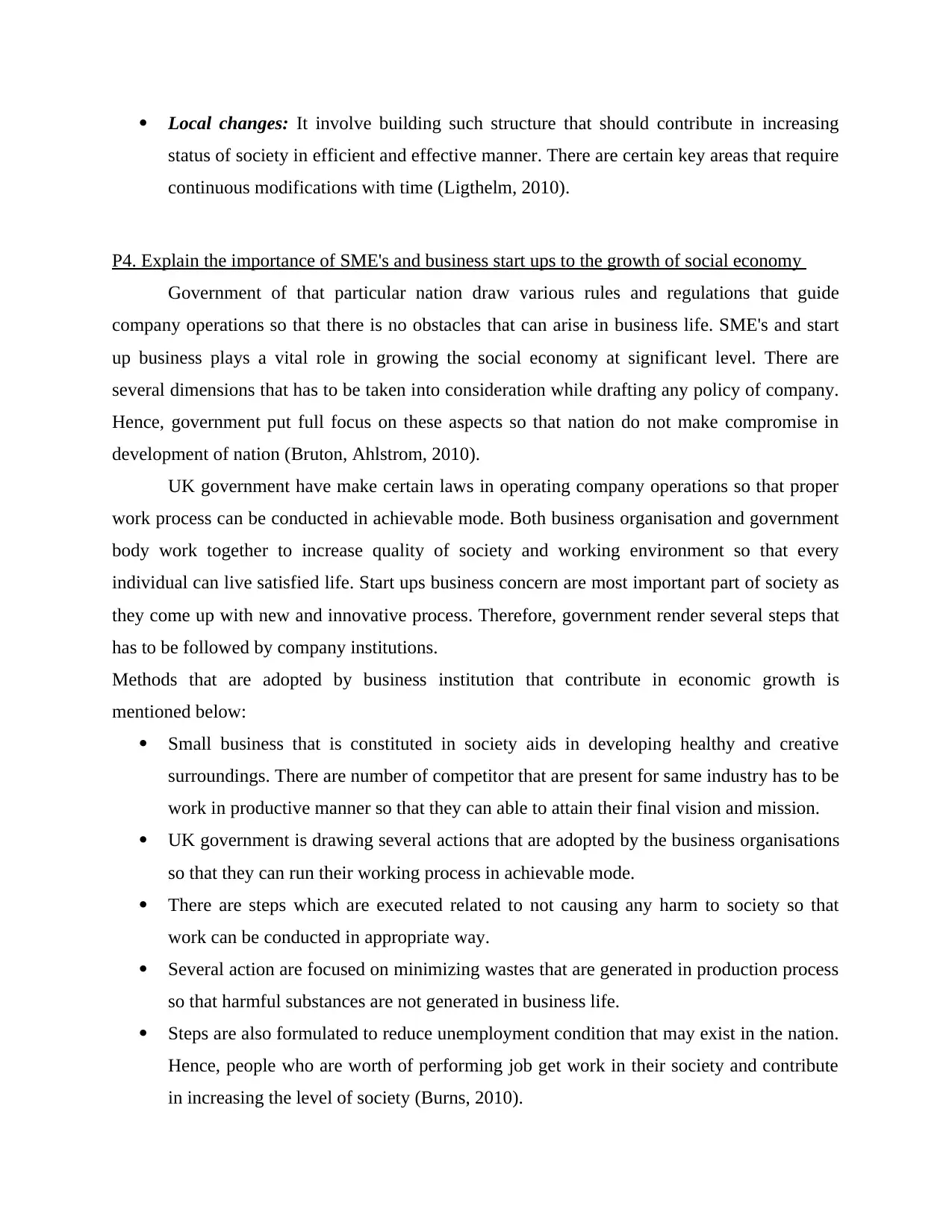
Local changes: It involve building such structure that should contribute in increasing
status of society in efficient and effective manner. There are certain key areas that require
continuous modifications with time (Ligthelm, 2010).
P4. Explain the importance of SME's and business start ups to the growth of social economy
Government of that particular nation draw various rules and regulations that guide
company operations so that there is no obstacles that can arise in business life. SME's and start
up business plays a vital role in growing the social economy at significant level. There are
several dimensions that has to be taken into consideration while drafting any policy of company.
Hence, government put full focus on these aspects so that nation do not make compromise in
development of nation (Bruton, Ahlstrom, 2010).
UK government have make certain laws in operating company operations so that proper
work process can be conducted in achievable mode. Both business organisation and government
body work together to increase quality of society and working environment so that every
individual can live satisfied life. Start ups business concern are most important part of society as
they come up with new and innovative process. Therefore, government render several steps that
has to be followed by company institutions.
Methods that are adopted by business institution that contribute in economic growth is
mentioned below:
Small business that is constituted in society aids in developing healthy and creative
surroundings. There are number of competitor that are present for same industry has to be
work in productive manner so that they can able to attain their final vision and mission.
UK government is drawing several actions that are adopted by the business organisations
so that they can run their working process in achievable mode.
There are steps which are executed related to not causing any harm to society so that
work can be conducted in appropriate way.
Several action are focused on minimizing wastes that are generated in production process
so that harmful substances are not generated in business life.
Steps are also formulated to reduce unemployment condition that may exist in the nation.
Hence, people who are worth of performing job get work in their society and contribute
in increasing the level of society (Burns, 2010).
status of society in efficient and effective manner. There are certain key areas that require
continuous modifications with time (Ligthelm, 2010).
P4. Explain the importance of SME's and business start ups to the growth of social economy
Government of that particular nation draw various rules and regulations that guide
company operations so that there is no obstacles that can arise in business life. SME's and start
up business plays a vital role in growing the social economy at significant level. There are
several dimensions that has to be taken into consideration while drafting any policy of company.
Hence, government put full focus on these aspects so that nation do not make compromise in
development of nation (Bruton, Ahlstrom, 2010).
UK government have make certain laws in operating company operations so that proper
work process can be conducted in achievable mode. Both business organisation and government
body work together to increase quality of society and working environment so that every
individual can live satisfied life. Start ups business concern are most important part of society as
they come up with new and innovative process. Therefore, government render several steps that
has to be followed by company institutions.
Methods that are adopted by business institution that contribute in economic growth is
mentioned below:
Small business that is constituted in society aids in developing healthy and creative
surroundings. There are number of competitor that are present for same industry has to be
work in productive manner so that they can able to attain their final vision and mission.
UK government is drawing several actions that are adopted by the business organisations
so that they can run their working process in achievable mode.
There are steps which are executed related to not causing any harm to society so that
work can be conducted in appropriate way.
Several action are focused on minimizing wastes that are generated in production process
so that harmful substances are not generated in business life.
Steps are also formulated to reduce unemployment condition that may exist in the nation.
Hence, people who are worth of performing job get work in their society and contribute
in increasing the level of society (Burns, 2010).
⊘ This is a preview!⊘
Do you want full access?
Subscribe today to unlock all pages.

Trusted by 1+ million students worldwide
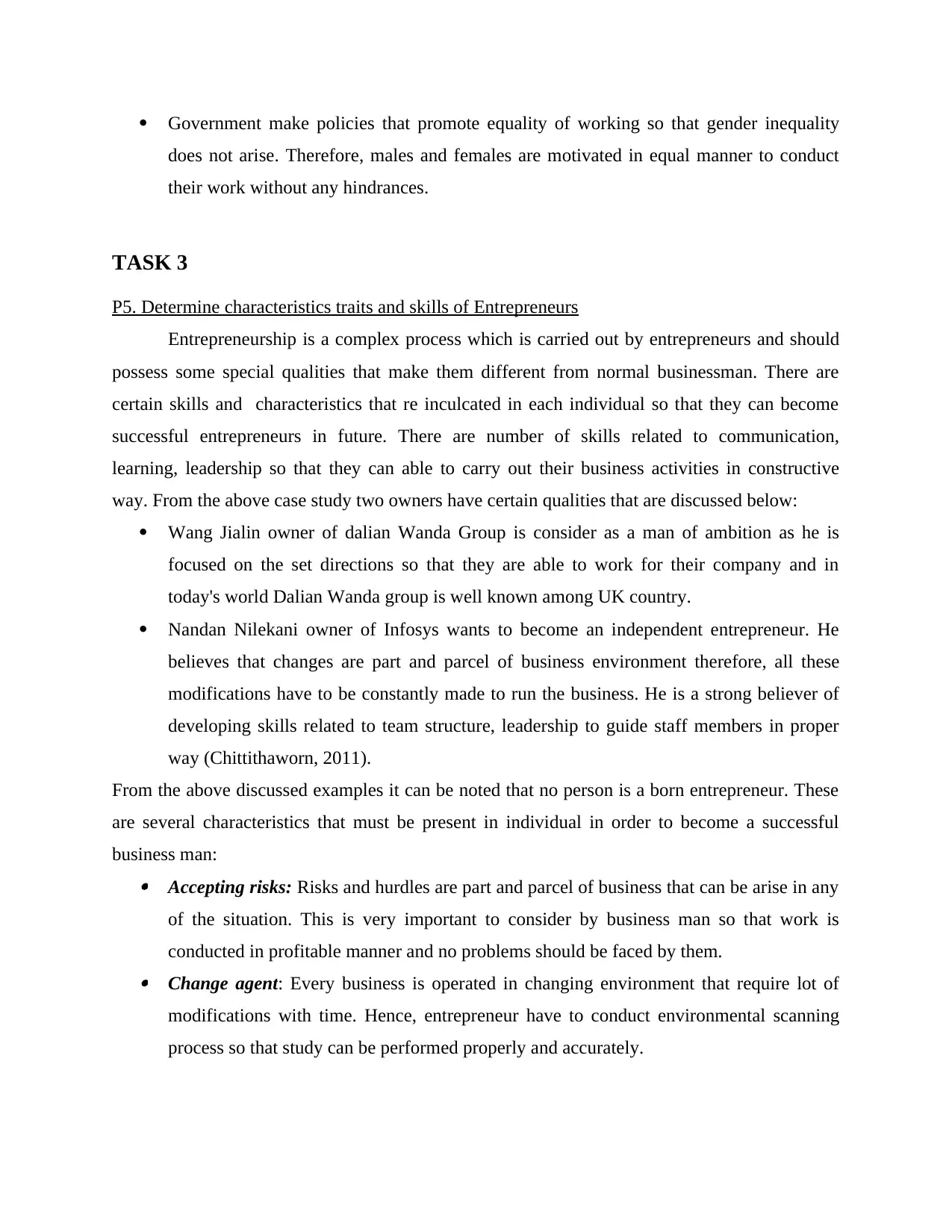
Government make policies that promote equality of working so that gender inequality
does not arise. Therefore, males and females are motivated in equal manner to conduct
their work without any hindrances.
TASK 3
P5. Determine characteristics traits and skills of Entrepreneurs
Entrepreneurship is a complex process which is carried out by entrepreneurs and should
possess some special qualities that make them different from normal businessman. There are
certain skills and characteristics that re inculcated in each individual so that they can become
successful entrepreneurs in future. There are number of skills related to communication,
learning, leadership so that they can able to carry out their business activities in constructive
way. From the above case study two owners have certain qualities that are discussed below:
Wang Jialin owner of dalian Wanda Group is consider as a man of ambition as he is
focused on the set directions so that they are able to work for their company and in
today's world Dalian Wanda group is well known among UK country.
Nandan Nilekani owner of Infosys wants to become an independent entrepreneur. He
believes that changes are part and parcel of business environment therefore, all these
modifications have to be constantly made to run the business. He is a strong believer of
developing skills related to team structure, leadership to guide staff members in proper
way (Chittithaworn, 2011).
From the above discussed examples it can be noted that no person is a born entrepreneur. These
are several characteristics that must be present in individual in order to become a successful
business man: Accepting risks: Risks and hurdles are part and parcel of business that can be arise in any
of the situation. This is very important to consider by business man so that work is
conducted in profitable manner and no problems should be faced by them. Change agent: Every business is operated in changing environment that require lot of
modifications with time. Hence, entrepreneur have to conduct environmental scanning
process so that study can be performed properly and accurately.
does not arise. Therefore, males and females are motivated in equal manner to conduct
their work without any hindrances.
TASK 3
P5. Determine characteristics traits and skills of Entrepreneurs
Entrepreneurship is a complex process which is carried out by entrepreneurs and should
possess some special qualities that make them different from normal businessman. There are
certain skills and characteristics that re inculcated in each individual so that they can become
successful entrepreneurs in future. There are number of skills related to communication,
learning, leadership so that they can able to carry out their business activities in constructive
way. From the above case study two owners have certain qualities that are discussed below:
Wang Jialin owner of dalian Wanda Group is consider as a man of ambition as he is
focused on the set directions so that they are able to work for their company and in
today's world Dalian Wanda group is well known among UK country.
Nandan Nilekani owner of Infosys wants to become an independent entrepreneur. He
believes that changes are part and parcel of business environment therefore, all these
modifications have to be constantly made to run the business. He is a strong believer of
developing skills related to team structure, leadership to guide staff members in proper
way (Chittithaworn, 2011).
From the above discussed examples it can be noted that no person is a born entrepreneur. These
are several characteristics that must be present in individual in order to become a successful
business man: Accepting risks: Risks and hurdles are part and parcel of business that can be arise in any
of the situation. This is very important to consider by business man so that work is
conducted in profitable manner and no problems should be faced by them. Change agent: Every business is operated in changing environment that require lot of
modifications with time. Hence, entrepreneur have to conduct environmental scanning
process so that study can be performed properly and accurately.
Paraphrase This Document
Need a fresh take? Get an instant paraphrase of this document with our AI Paraphraser
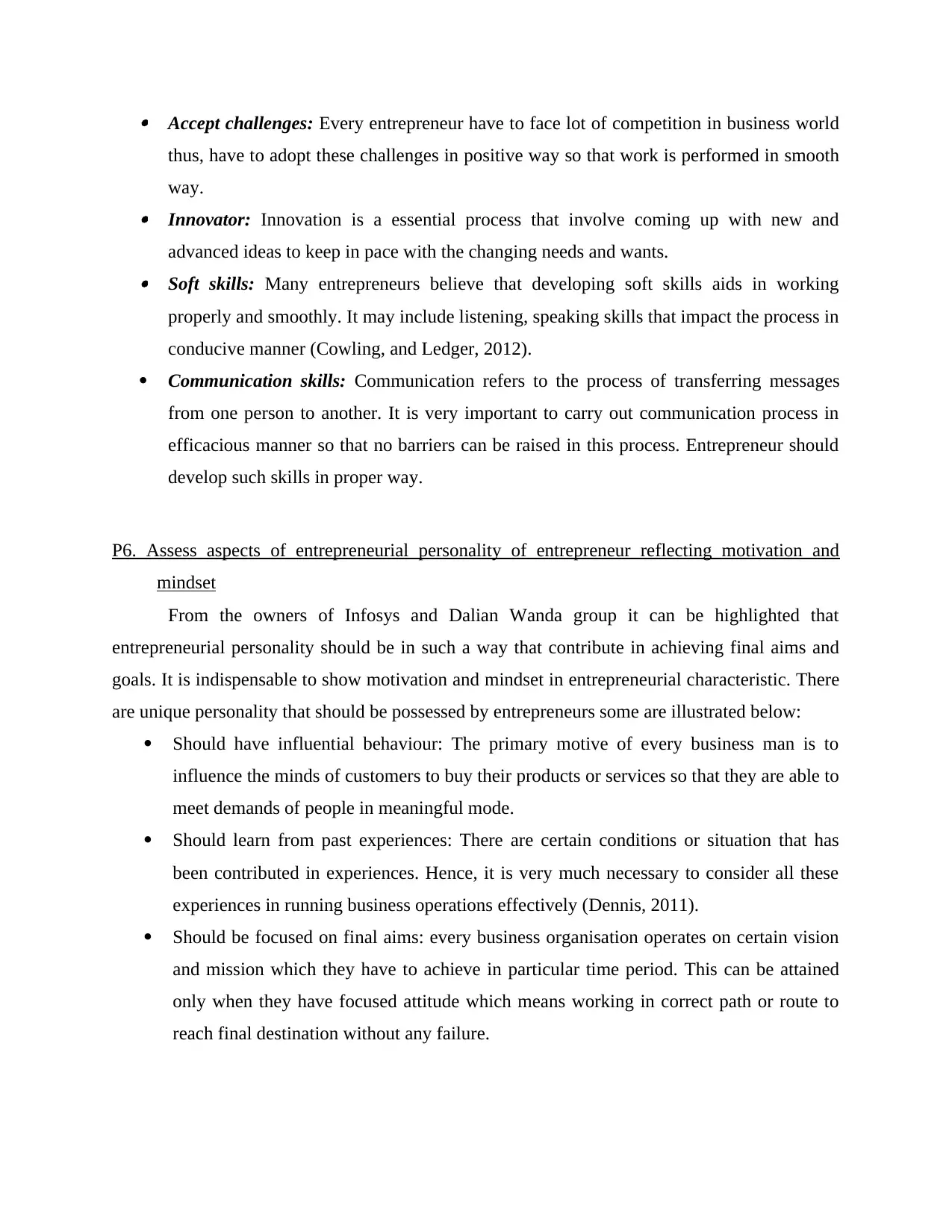
Accept challenges: Every entrepreneur have to face lot of competition in business world
thus, have to adopt these challenges in positive way so that work is performed in smooth
way. Innovator: Innovation is a essential process that involve coming up with new and
advanced ideas to keep in pace with the changing needs and wants. Soft skills: Many entrepreneurs believe that developing soft skills aids in working
properly and smoothly. It may include listening, speaking skills that impact the process in
conducive manner (Cowling, and Ledger, 2012).
Communication skills: Communication refers to the process of transferring messages
from one person to another. It is very important to carry out communication process in
efficacious manner so that no barriers can be raised in this process. Entrepreneur should
develop such skills in proper way.
P6. Assess aspects of entrepreneurial personality of entrepreneur reflecting motivation and
mindset
From the owners of Infosys and Dalian Wanda group it can be highlighted that
entrepreneurial personality should be in such a way that contribute in achieving final aims and
goals. It is indispensable to show motivation and mindset in entrepreneurial characteristic. There
are unique personality that should be possessed by entrepreneurs some are illustrated below:
Should have influential behaviour: The primary motive of every business man is to
influence the minds of customers to buy their products or services so that they are able to
meet demands of people in meaningful mode.
Should learn from past experiences: There are certain conditions or situation that has
been contributed in experiences. Hence, it is very much necessary to consider all these
experiences in running business operations effectively (Dennis, 2011).
Should be focused on final aims: every business organisation operates on certain vision
and mission which they have to achieve in particular time period. This can be attained
only when they have focused attitude which means working in correct path or route to
reach final destination without any failure.
thus, have to adopt these challenges in positive way so that work is performed in smooth
way. Innovator: Innovation is a essential process that involve coming up with new and
advanced ideas to keep in pace with the changing needs and wants. Soft skills: Many entrepreneurs believe that developing soft skills aids in working
properly and smoothly. It may include listening, speaking skills that impact the process in
conducive manner (Cowling, and Ledger, 2012).
Communication skills: Communication refers to the process of transferring messages
from one person to another. It is very important to carry out communication process in
efficacious manner so that no barriers can be raised in this process. Entrepreneur should
develop such skills in proper way.
P6. Assess aspects of entrepreneurial personality of entrepreneur reflecting motivation and
mindset
From the owners of Infosys and Dalian Wanda group it can be highlighted that
entrepreneurial personality should be in such a way that contribute in achieving final aims and
goals. It is indispensable to show motivation and mindset in entrepreneurial characteristic. There
are unique personality that should be possessed by entrepreneurs some are illustrated below:
Should have influential behaviour: The primary motive of every business man is to
influence the minds of customers to buy their products or services so that they are able to
meet demands of people in meaningful mode.
Should learn from past experiences: There are certain conditions or situation that has
been contributed in experiences. Hence, it is very much necessary to consider all these
experiences in running business operations effectively (Dennis, 2011).
Should be focused on final aims: every business organisation operates on certain vision
and mission which they have to achieve in particular time period. This can be attained
only when they have focused attitude which means working in correct path or route to
reach final destination without any failure.
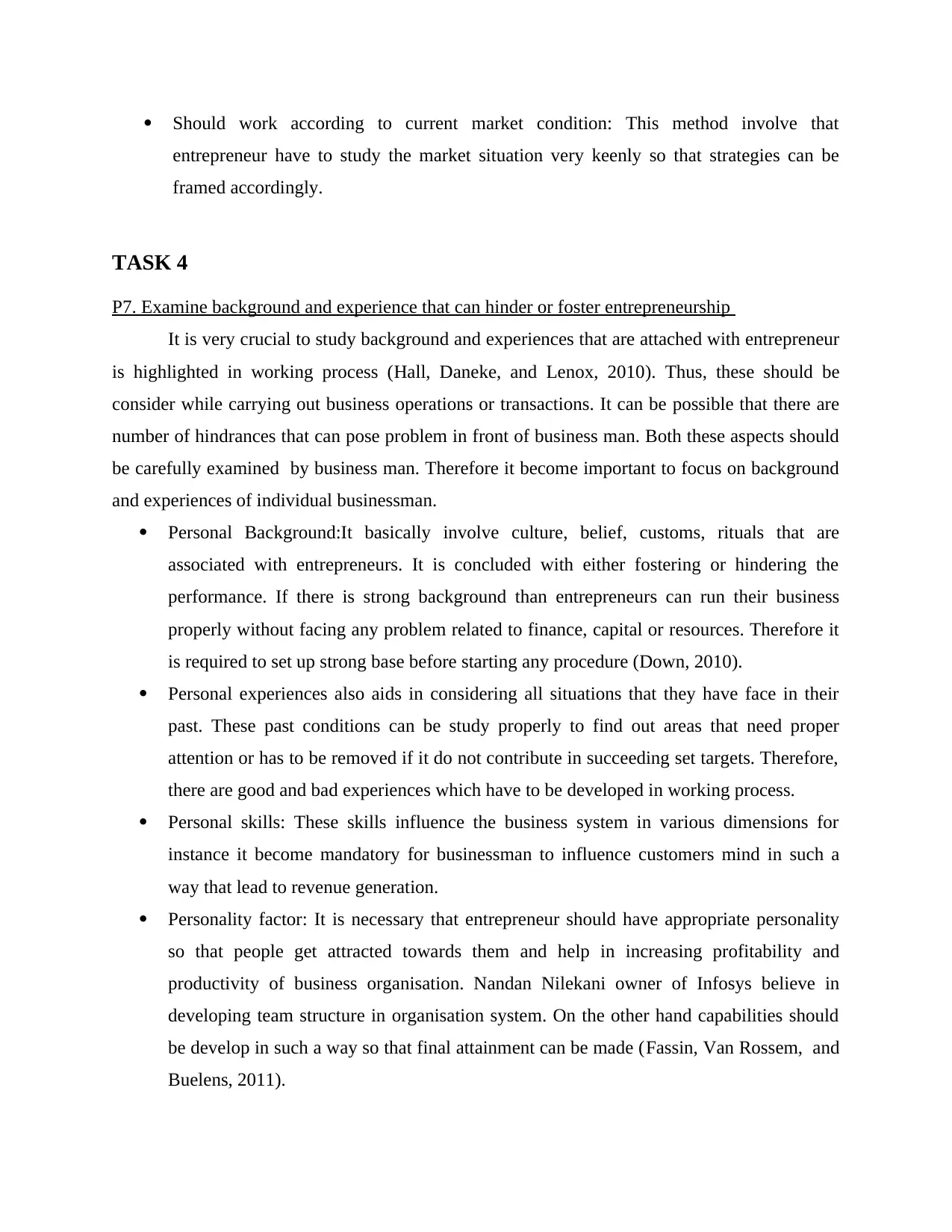
Should work according to current market condition: This method involve that
entrepreneur have to study the market situation very keenly so that strategies can be
framed accordingly.
TASK 4
P7. Examine background and experience that can hinder or foster entrepreneurship
It is very crucial to study background and experiences that are attached with entrepreneur
is highlighted in working process (Hall, Daneke, and Lenox, 2010). Thus, these should be
consider while carrying out business operations or transactions. It can be possible that there are
number of hindrances that can pose problem in front of business man. Both these aspects should
be carefully examined by business man. Therefore it become important to focus on background
and experiences of individual businessman.
Personal Background:It basically involve culture, belief, customs, rituals that are
associated with entrepreneurs. It is concluded with either fostering or hindering the
performance. If there is strong background than entrepreneurs can run their business
properly without facing any problem related to finance, capital or resources. Therefore it
is required to set up strong base before starting any procedure (Down, 2010).
Personal experiences also aids in considering all situations that they have face in their
past. These past conditions can be study properly to find out areas that need proper
attention or has to be removed if it do not contribute in succeeding set targets. Therefore,
there are good and bad experiences which have to be developed in working process.
Personal skills: These skills influence the business system in various dimensions for
instance it become mandatory for businessman to influence customers mind in such a
way that lead to revenue generation.
Personality factor: It is necessary that entrepreneur should have appropriate personality
so that people get attracted towards them and help in increasing profitability and
productivity of business organisation. Nandan Nilekani owner of Infosys believe in
developing team structure in organisation system. On the other hand capabilities should
be develop in such a way so that final attainment can be made (Fassin, Van Rossem, and
Buelens, 2011).
entrepreneur have to study the market situation very keenly so that strategies can be
framed accordingly.
TASK 4
P7. Examine background and experience that can hinder or foster entrepreneurship
It is very crucial to study background and experiences that are attached with entrepreneur
is highlighted in working process (Hall, Daneke, and Lenox, 2010). Thus, these should be
consider while carrying out business operations or transactions. It can be possible that there are
number of hindrances that can pose problem in front of business man. Both these aspects should
be carefully examined by business man. Therefore it become important to focus on background
and experiences of individual businessman.
Personal Background:It basically involve culture, belief, customs, rituals that are
associated with entrepreneurs. It is concluded with either fostering or hindering the
performance. If there is strong background than entrepreneurs can run their business
properly without facing any problem related to finance, capital or resources. Therefore it
is required to set up strong base before starting any procedure (Down, 2010).
Personal experiences also aids in considering all situations that they have face in their
past. These past conditions can be study properly to find out areas that need proper
attention or has to be removed if it do not contribute in succeeding set targets. Therefore,
there are good and bad experiences which have to be developed in working process.
Personal skills: These skills influence the business system in various dimensions for
instance it become mandatory for businessman to influence customers mind in such a
way that lead to revenue generation.
Personality factor: It is necessary that entrepreneur should have appropriate personality
so that people get attracted towards them and help in increasing profitability and
productivity of business organisation. Nandan Nilekani owner of Infosys believe in
developing team structure in organisation system. On the other hand capabilities should
be develop in such a way so that final attainment can be made (Fassin, Van Rossem, and
Buelens, 2011).
⊘ This is a preview!⊘
Do you want full access?
Subscribe today to unlock all pages.

Trusted by 1+ million students worldwide
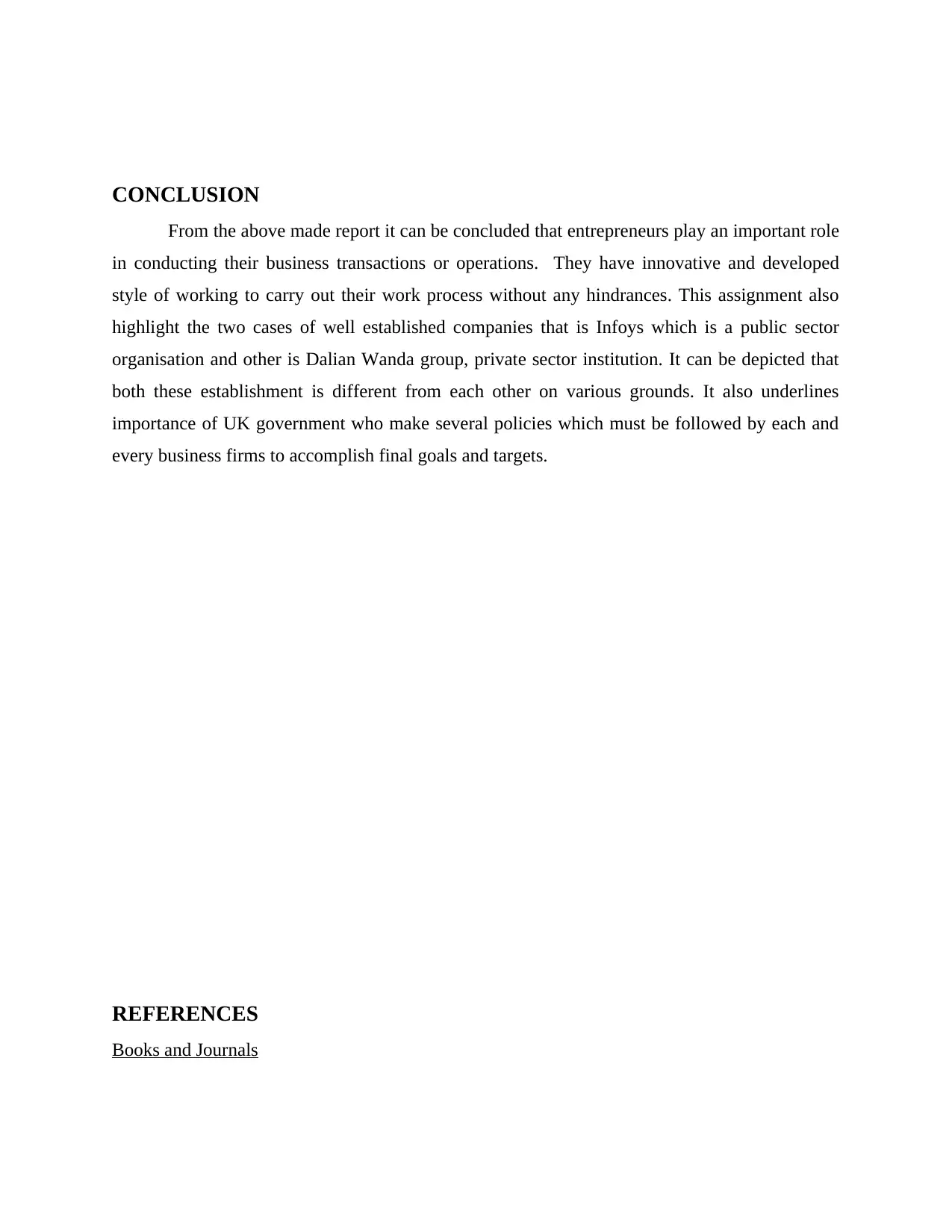
CONCLUSION
From the above made report it can be concluded that entrepreneurs play an important role
in conducting their business transactions or operations. They have innovative and developed
style of working to carry out their work process without any hindrances. This assignment also
highlight the two cases of well established companies that is Infoys which is a public sector
organisation and other is Dalian Wanda group, private sector institution. It can be depicted that
both these establishment is different from each other on various grounds. It also underlines
importance of UK government who make several policies which must be followed by each and
every business firms to accomplish final goals and targets.
REFERENCES
Books and Journals
From the above made report it can be concluded that entrepreneurs play an important role
in conducting their business transactions or operations. They have innovative and developed
style of working to carry out their work process without any hindrances. This assignment also
highlight the two cases of well established companies that is Infoys which is a public sector
organisation and other is Dalian Wanda group, private sector institution. It can be depicted that
both these establishment is different from each other on various grounds. It also underlines
importance of UK government who make several policies which must be followed by each and
every business firms to accomplish final goals and targets.
REFERENCES
Books and Journals
Paraphrase This Document
Need a fresh take? Get an instant paraphrase of this document with our AI Paraphraser
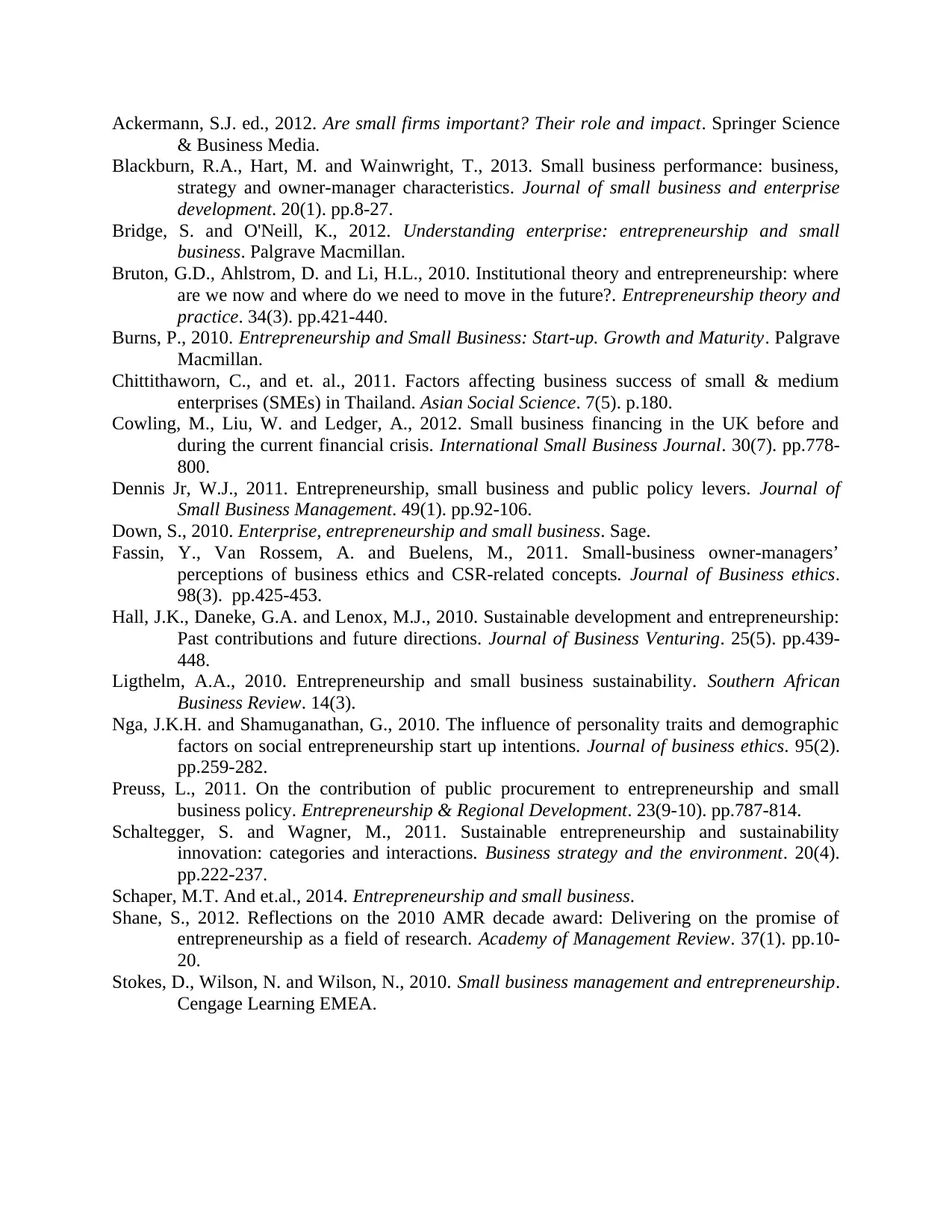
Ackermann, S.J. ed., 2012. Are small firms important? Their role and impact. Springer Science
& Business Media.
Blackburn, R.A., Hart, M. and Wainwright, T., 2013. Small business performance: business,
strategy and owner-manager characteristics. Journal of small business and enterprise
development. 20(1). pp.8-27.
Bridge, S. and O'Neill, K., 2012. Understanding enterprise: entrepreneurship and small
business. Palgrave Macmillan.
Bruton, G.D., Ahlstrom, D. and Li, H.L., 2010. Institutional theory and entrepreneurship: where
are we now and where do we need to move in the future?. Entrepreneurship theory and
practice. 34(3). pp.421-440.
Burns, P., 2010. Entrepreneurship and Small Business: Start-up. Growth and Maturity. Palgrave
Macmillan.
Chittithaworn, C., and et. al., 2011. Factors affecting business success of small & medium
enterprises (SMEs) in Thailand. Asian Social Science. 7(5). p.180.
Cowling, M., Liu, W. and Ledger, A., 2012. Small business financing in the UK before and
during the current financial crisis. International Small Business Journal. 30(7). pp.778-
800.
Dennis Jr, W.J., 2011. Entrepreneurship, small business and public policy levers. Journal of
Small Business Management. 49(1). pp.92-106.
Down, S., 2010. Enterprise, entrepreneurship and small business. Sage.
Fassin, Y., Van Rossem, A. and Buelens, M., 2011. Small-business owner-managers’
perceptions of business ethics and CSR-related concepts. Journal of Business ethics.
98(3). pp.425-453.
Hall, J.K., Daneke, G.A. and Lenox, M.J., 2010. Sustainable development and entrepreneurship:
Past contributions and future directions. Journal of Business Venturing. 25(5). pp.439-
448.
Ligthelm, A.A., 2010. Entrepreneurship and small business sustainability. Southern African
Business Review. 14(3).
Nga, J.K.H. and Shamuganathan, G., 2010. The influence of personality traits and demographic
factors on social entrepreneurship start up intentions. Journal of business ethics. 95(2).
pp.259-282.
Preuss, L., 2011. On the contribution of public procurement to entrepreneurship and small
business policy. Entrepreneurship & Regional Development. 23(9-10). pp.787-814.
Schaltegger, S. and Wagner, M., 2011. Sustainable entrepreneurship and sustainability
innovation: categories and interactions. Business strategy and the environment. 20(4).
pp.222-237.
Schaper, M.T. And et.al., 2014. Entrepreneurship and small business.
Shane, S., 2012. Reflections on the 2010 AMR decade award: Delivering on the promise of
entrepreneurship as a field of research. Academy of Management Review. 37(1). pp.10-
20.
Stokes, D., Wilson, N. and Wilson, N., 2010. Small business management and entrepreneurship.
Cengage Learning EMEA.
& Business Media.
Blackburn, R.A., Hart, M. and Wainwright, T., 2013. Small business performance: business,
strategy and owner-manager characteristics. Journal of small business and enterprise
development. 20(1). pp.8-27.
Bridge, S. and O'Neill, K., 2012. Understanding enterprise: entrepreneurship and small
business. Palgrave Macmillan.
Bruton, G.D., Ahlstrom, D. and Li, H.L., 2010. Institutional theory and entrepreneurship: where
are we now and where do we need to move in the future?. Entrepreneurship theory and
practice. 34(3). pp.421-440.
Burns, P., 2010. Entrepreneurship and Small Business: Start-up. Growth and Maturity. Palgrave
Macmillan.
Chittithaworn, C., and et. al., 2011. Factors affecting business success of small & medium
enterprises (SMEs) in Thailand. Asian Social Science. 7(5). p.180.
Cowling, M., Liu, W. and Ledger, A., 2012. Small business financing in the UK before and
during the current financial crisis. International Small Business Journal. 30(7). pp.778-
800.
Dennis Jr, W.J., 2011. Entrepreneurship, small business and public policy levers. Journal of
Small Business Management. 49(1). pp.92-106.
Down, S., 2010. Enterprise, entrepreneurship and small business. Sage.
Fassin, Y., Van Rossem, A. and Buelens, M., 2011. Small-business owner-managers’
perceptions of business ethics and CSR-related concepts. Journal of Business ethics.
98(3). pp.425-453.
Hall, J.K., Daneke, G.A. and Lenox, M.J., 2010. Sustainable development and entrepreneurship:
Past contributions and future directions. Journal of Business Venturing. 25(5). pp.439-
448.
Ligthelm, A.A., 2010. Entrepreneurship and small business sustainability. Southern African
Business Review. 14(3).
Nga, J.K.H. and Shamuganathan, G., 2010. The influence of personality traits and demographic
factors on social entrepreneurship start up intentions. Journal of business ethics. 95(2).
pp.259-282.
Preuss, L., 2011. On the contribution of public procurement to entrepreneurship and small
business policy. Entrepreneurship & Regional Development. 23(9-10). pp.787-814.
Schaltegger, S. and Wagner, M., 2011. Sustainable entrepreneurship and sustainability
innovation: categories and interactions. Business strategy and the environment. 20(4).
pp.222-237.
Schaper, M.T. And et.al., 2014. Entrepreneurship and small business.
Shane, S., 2012. Reflections on the 2010 AMR decade award: Delivering on the promise of
entrepreneurship as a field of research. Academy of Management Review. 37(1). pp.10-
20.
Stokes, D., Wilson, N. and Wilson, N., 2010. Small business management and entrepreneurship.
Cengage Learning EMEA.

⊘ This is a preview!⊘
Do you want full access?
Subscribe today to unlock all pages.

Trusted by 1+ million students worldwide
1 out of 12
Related Documents
Your All-in-One AI-Powered Toolkit for Academic Success.
+13062052269
info@desklib.com
Available 24*7 on WhatsApp / Email
![[object Object]](/_next/static/media/star-bottom.7253800d.svg)
Unlock your academic potential
Copyright © 2020–2026 A2Z Services. All Rights Reserved. Developed and managed by ZUCOL.




